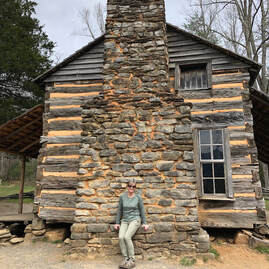 Me sitting along fireplace at one of the cabins. Cades Cove Me sitting along fireplace at one of the cabins. Cades Cove Before it became a national park that draws more than 12 million people a year, The Smoky Mountains National Park was home to the Cherokee, and after that, settlers from Europe. They settled in the ‘coves’ or flat valley areas in the mountains which allowed them to raise crops and livestock. They had churches, schools, unique cantilevered barns, henhouses, and cabins. Thankfully, a historian had the foresight to encourage the government to preserve homesteads in the park as cultural heritage sites. And that is where the research journey for my novel, The Truth of Who You Are began. What drew me first to the region (besides the majestic mountains) were the stories of the people who once inhabited Cades Cove. The community structures are still intact, preserved by the park for visitors to witness what it may have been like growing up in the shadows of the mountains. Regional museums have books about the people who once lived in the area, how they conducted business, and lived before the government bought them out to make the national park during the Great Depression. This eleven-mile circuit holds what remains of an entire community that once lived there: homes, corn cribs, barns, smoke, and spring houses.
0 Comments
3/26/2023 My Segmented Reality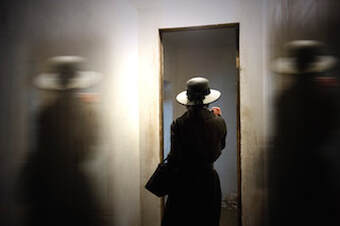 Photo by Monica Silva on Unsplash Photo by Monica Silva on Unsplash I'm a mother, wife, educator. I'm a writer. Although I try to remain in the present, I find my mind wandering to the depths of my imagination, attempting to tease out the next scene in my novel, a character flaw, joy, despair. I am stretched to capacity to create. Between lesson plans on critical thinking, what to make for dinner, how I'm going to kill off one the characters in my novels, my mind has limited time to stay in the moment. Even in the car, while driving to and from different campus sites I listen to podcasts, gleaning inspiration on writing, marketing, thinking. Oprahs's Super Soul Conversation reminds me what I should be doing: "Time to be more fully present.....starts right now." I'm soooo sorry Oprah - I listen to your podcast once a week, gaze at the rural landscape streaking past my window, warm earth interspersed with golden corn stubble from last year's harvest, a flock of white geese taking flight, sparkling like dust motes in the March sun. And oh, what did Amy Purdy just say about resilience? I was framing the moment for a scene in my next novel. I can't be the only one with a creative mindset trapped in the mundane day-to-day responsibilities that keep the family going, the heater operating as winter clings; I learned from a New York Times article, it's true. Many famous artists and writers maintained separate, working lives. Does it mean they produced better art? I know I feel a pressure to create whenever there is a moment: an hour on a Saturday, winter break, spring break, summer. I develop timelines around my school schedule, can I get to 50k words by May? How many weekends and breaks do I have? How much grading to do? Will one of my daughters be in town for the weekend? If I had more time, if my life weren't segmented into pieces of me, I'm not sure I'd be any better at my craft. As someone close to me once said, 'you work better under pressure, with deadlines'. I don't meander once I sit down to write, the words come to me, have been building over time, while driving, in my journals, in my dreams. My characters speak to me. And I don't let them down. 6/23/2022 1 Comment Finding Purpose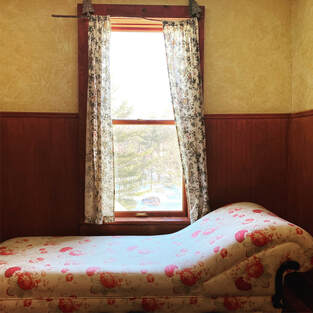 I'm revisiting blog posts from the past and this one struck me because I just finished launching my fifth novel and this same feeling of loss can be overwhelming. If I let it be. This morning I was listening to Ann Lamott's book Small Victories: Spotting Improbably Moments of Grace, and her first lines just jolted me: "The worst possible thing you can do when you’re down in the dumps, tweaking, vaporous with victimized self-righteousness, or bored, is to take a walk with dying friends. They will ruin everything for you." I have not, I must admit, recently walked with a friend who is close to death, but I could relate to what Lamott was saying. Lately I have been wallowing a bit too much in self-pity, for no reason whatsoever except perhaps because I have completed my novel and although I'm working on the next, I definitely feel a sense of loss. And, I must admit, although I never started on this journey for the accolades, (and most obviously not for the money) there are moments when I wish that everyone I meet at the coffee shop, or passing by on the street would just say to me: "Hey, I heard you wrote another book. Congratulations," even if they have never read any of my work. I was at a picnic a few weeks ago and something like this happened and I was amazed at how much it lifted my spirits. A man came up to me, someone I know through my children, and he told me he had read one of my novels: Ephemeral Summer, and he loved it. I was a bit shocked. It is a coming of age story and the target audience would be his college-age daughters. "Everyone in the family has read it," he told me, "We loved it." I'd like to believe I'm not vain. But maybe I am. Or maybe these feelings I'm experiencing are meant to teach me something. How often I have neglected to tell someone that what they did or are doing is worthy: my friend who spent a year volunteering on a political campaign for a candidate I didn't plan to vote for; or another, who spent 6 months learning to become a yoga instructor. And then there is my friend who opened her own shop; and another friend who drove almost every weekend this past spring, over 11 hours in the car, one way, to watch her daughter play college ball. Finally, there are more than a few, who have had to sit by the side of their loved ones while they undergo treatments, trying to keep the faith. What dedication. My own family members have started new jobs, struck out on their own, or started up support groups. Congratulating them, or even making some commentary on their hard work is something I think, I should remember to do, if for no other reason than because they are trying. They are living life the way it was meant to be lived: with purpose. 1/25/2022 1 Comment The Book That Won't Quit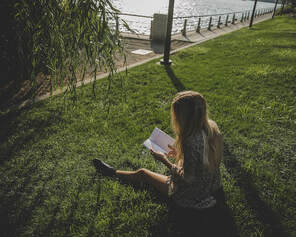 Photo by Thought Catalog on Unsplash Photo by Thought Catalog on Unsplash About five years ago I was on a trip in the Orcas Islands when I learned about the men in the Civilian Conservation Corps who worked for a measly $5.00/week during the Great Depression, building infrastructure and planting over 1 billion trees in our nation's parks. Of course I'd heard of these men but never knew much about their work or their history. But after reading about the Corps, the multitude of men who hearkened from diverse geographic backgrounds, many of them first and second generation immigrants, I felt compelled to tell their story. I hadn't realized it at the time, but this book project titled The Truth of Who You Are, would become an emotional journey for me that had me doubting myself time and time again. Was it worth it? I kept asking. Let me list the tribulations to see this novel through to a publishing deal. 1) Research - since the novel is historical, I had to do research, which meant traveling to some of the sites where these men worked. Being self-funded, I launched an online crowdfunding campaign. I made a video, which took hours, and I almost made my goals. But the campaign failed and I wrote about it here. So I scaled back my travel plans to something doable - research in the Smoky Mountains, near where my parents lived in South Carolina. There was a lot of history to work with and hey, it's a tax write off, right? 2) Contests - I am a sucker for them. After winning one literary contest in 2017 for my novel The Night is Done, I figured I might be in a roll, so why not enter my work in progress to some contests , see how it goes? I entered The Truth of Who You Are in five writing contests. It gained semi-finalist status in one, and lost in two others. One is still pending. But the most heartbreaking loss was a national, prestigious contest that required I not pitch the book to anyone, no agents or publishers, until they told me it was out of the running. Five months later and two weeks before they were going to announce the winner, I still hadn't heard anything. My novel was still in the running. I couldn't believe it. The prize was $25,000 and a publishing contract. Could it be that The Truth of Who You Are had won? Everyday that I opened my email and there was no rejection I got my hopes up. My anxiety level was through the roof. I told only a few select friends and family about my anticipation. And then....rejection. 3) Publishers and Agents- I've attended numerous conferences over the past few years, pitching this novel to agents and editors at publishing houses. One editor wrote back to me with constructive feedback as well as encouraging words. "The Conservation Corps sections are terrific, I think. They really conjure time and place and show the impact of the programs on the people who participated in them and on the communities they served. And the burgeoning romance is nicely done as well." Yay! I revised and resubmitted. It was rejected. That was one of many to come from other agents and publishers, after they requested to read the whole manuscript. 4) Revise, revise, revise - the next step in the process is always to self-reflect, reexamine the manuscript and revise. At some point though one has to decide. What is the issue here? Is this novel not marketable? What do people want? Many revisions later, I adjusted the concept, and started all over again with the pitching. 5) Publishing Contract - I sent the novel to a small publisher who offed me a contract. Yay! Then I read the contract. That and a few other things led me to believe I'd be no better off than if I published it myself, so I declined. I can't even begin to tell you what a gut wrenching decision that was. 6) Giving up - I firmly believe in this novel. I know what it feels like to not believe something is worth pursuing. I have a novel I wrote about smuggling along the US/Canadian border sitting on my laptop which will never see print. But this novel, The Truth of Who You Are, is different. I've had positive feedback from several readers, people who I've only met in online writing circles. And my critique partner, who is brutally honest, told me it is my best writing so far. Recently a publisher asked me for the full manuscript and I’m waiting for their response. Their contract is posted on their website and seems more favorable. So we'll see. Like I said, this book won't quit. But I imagine, neither did these guys from the Conservation Corps. Post script: I wrote this blog in November 2019 and have since signed a contract with Black Rose Writing to publish. The novel launches April 28, 2022. You can pre-order (discounted) ebooks at the following links. 1/22/2021 The EncounterA short story that appeared in the Stone Canoe Literary Magazine February 2020  Eve popped the little blue pill in her mouth and took a draw of cappuccino, leaving a ring of currant lipstick on the white plastic lid. The hot steam bit her upper lip bringing tears to her eyes. Wet snow flakes splotched the windshield and gray clouds churned the sky. People were milling outside a cannabis shop and she wondered if weed might be more effective. She just had to get through the morning and then everything would be fine. The car clock said 7:30 am; how long before she needed another pill? Ever since Dylan called attention to her habit, she'd started to keep track and the longest lapse had been eight hours. At 11:55 a.m. she grabbed her bag out of the desk drawer and waved goodbye to her office mates. Next stop: her apartment to pick up the cooler, Lisa, Dylan, then off for their annual trip with friends. A weekend at the edge of one of the parks near Denver. They'd been taking this yearly excursion on Presidents' Day weekend every year since college. Her anticipation sank when she pulled into her driveway at 12:30, checked her cell phone and read Dylan's text: Stuck on a big project. Leave without me. I'll catch a ride with Brittany and Mateo. Meet later She texted back: You've got to be kidding me. Deleted it, and texted: OK, see you later. Smile emoji. Snowflake. She lugged the cooler and food into the car and drove to Lisa's apartment, relieved to see her standing outside her door waiting, bundled in a parka, a pair of cross country skis leaning against her arm. "Where's Dylan?" "He's leaving with Brittany and Mateo. Meeting us there." "That's odd," Lisa said. "Why?" "Because Sam told me he's bringing Mateo after they get out of work tonight." Eve put the car in gear and pulled away from the curb. She didn't want to think about how she had left work early and Dylan didn't. Why his career was more important than hers. Within an hour the Continental Divide broke the horizon. Her thoughts wandered to work. Would her boss point out Eve's absence in a snarky remark at the next staff meeting? Her pulse quickened and she felt a bead of sweat drip down her neck. She unzipped her coat. "Help me out of this will you?" She gripped the wheel with one hand while jerking her other arm free of a sleeve. A rush of cold air made Eve shiver. Free. "You all right? You look kind of flushed? Want me to drive?" Lisa said. "I'm fine. Just got over-heated there for a moment." She shot Lisa a weak smile. "I'm anxious to get there and snow shoe before dusk." "If we get there before dusk." Lisa was facing the window. "I need to stop and use the restroom," Eve said. Staring into the mirror over the sink she debated with herself. It was 2 pm. Her hands were shaking. A piece of hair fell over her face, blinkering one eye. The mirror had a large crack in the upper right- hand corner, black bubbles floated at the edges where the silver backing was wearing thin. In the reflection, the door to the restroom was hanging on rusted hinges. Tugging at the strand of hair, she concentrated on her breathing. The little blue pill was dissolving in her sweaty palm. Take it now and you'll be settled by the time we get to the cabin and everyone arrives. Then you won't need another until Tuesday. She put one in her mouth, cupped her hand under the faucet to catch some water and slurped down the bitter after-taste. "You can drive," Eve said, tossing Lisa the keys. She texted Dylan: Who's driving? Lisa said Mateo coming later with Sam. Every few minutes she checked to see if there was a return text. "You have bars?" Eve asked. Lisa shrugged and tossed her phone to Eve. "Did Sam text you? When is he leaving?" Eve said. "I haven't heard from him since before we left. What's the matter?" Eve turned to face the window. "Nothing. I'm just nervous about my job." 1/30/2020 The Anatomy of a Historical Novel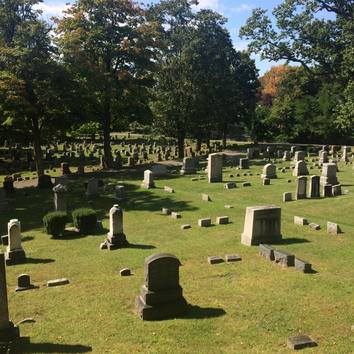 Fort Hill Cemetery, Auburn NY Fort Hill Cemetery, Auburn NY Often, when I'm giving a talk about my novels I'm asked, where did you come up with the idea to write the story? I get my inspiration from past. I started to research the Durant family saga - after staying in a cabin hidden in the wilderness that was supposedly built by William West Durant for trysts with his mistress. What I thought would be a one book love story/romance, turned into a four year research journey. This folklore about William and his mistress started me down a path of clues that shed light on the lives of the Durant family and had me visiting the New York Public Library, the Library of Congress, Winterthur Museum, the Adirondack Museum, and England. My one book idea turned into a trilogy. Soon after I was finished with my draft of novel three in the trilogy, I was visiting my family in South Carolina and ended up hiking in the Great Smoky Mountains, one the US most popular National Park. I was intrigued with the history of the people who once lived in the park and were eventually forced out--like the residents of Cades Cove--now a Cultural Heritage site in the park. And then there is the story of the Walker Sisters, who, due to their age, were allowed to stay in their cabins until they died. I found fascinating oral histories about the former residents in the bookstore of the Smoky Mountains Cultural Heritage Museum in Townsend, TN. While the research is a slow and steady task, never really ending, a lot of it can be done via use of digital archival material. However, the writing takes dedication. I'm lucky enough to be in an academic profession that allows me chunks of time to write. In the summer months I spend the mornings in a library or coffee house writing until I reach 3k words (usually about two-three hours). I do this until I have a rough draft of a novel - about 80k words. Editing takes another year if not more. Indeed, I am still editing the novel I wrote set in the Great Smoky Mountains, The Truth of Who You Are, as it is now out on submission with publishers. Once in a while I panic, thinking, will I ever run out of ideas on what to write about? What if this novel is my last? Can I keep up with the research and the creative process involved in putting out a novel set in the past about real people and events? Recently, while walking in the famous Fort Hill Cemetery in Auburn, NY where Harriet Tubman, and William Seward are buried, I thought about how many stories there are to tell and thought, "I'll ever run out of material." 4/23/2019 We Are All Made of StoriesWhile visiting my aging parents recently I attended a social gathering of their friends and neighbors. A man I was conversing with told me about his work at Eastman Kodak before its slow dissolution. When I mentioned I was an author of historical fiction and thought the history of the Kodak Company might make a good non-fiction book, he proceeded to tell me that more importantly, he wanted someone to write about the Hungarian revolt against the Soviet Union in 1956. He was part of the revolt as a teen. But he had to flee along with 200,000 other refugees, when the revolt was violently crushed by the Soviets after only 12 days. The ghost writer he had hired to write his memoir died and the idea that his story would never be written nor published was weighing on him.
This man had a best friend-a fellow comrade aged 16 who was captured by the Soviets. The Soviet's had a law that made it illegal to put someone under 18 to death, so they held his friend in prison until he turned 18 and then executed him. My mother told me that as she ages she has been having flashbacks-vivid memories of her childhood that she had long forgotten. If this is so for most people as they age (and I have no idea if it is) then I suppose for this man, his visions of the tumultuous 12 days and loss of his best friend must be haunting him. He spent the better part of an hour discussing it with me. He told me not many people know about this time in history (it was only 12 days but had greater ramifications for the U.S./Soviet relationship.) He told me the citizens of Hungary were the only ones that revolted against the Soviets although so many in the Union despised the oppression. He eyes were filled with loathing. I've met numerous writers at conferences who are there to learn how to publish a memoir. I wish my life was that interesting. Although I've used vignettes from my personal experience or people I've known for my fiction (specifically in Ephemeral Summer I wrote a scene where the main characters are tracking moose in Algonquin Provincial Forest for scientific research, something I did in graduate school), my fiction is mainly about other people's lives. Just recently I picked up a book titled: Ithaca Diaries, written by Anita Harris about her days as a college student at Cornell University in the late 1960s early 1970s. How brave to write about coming of age during the race and anti-Vietnam War riots taking place on campus. Personally, I'd rather write a fictionalized version of someone else's past. But I have a high regard for writers who feel they have an important story to tell: their own. 3/10/2019 This Too Shall Pass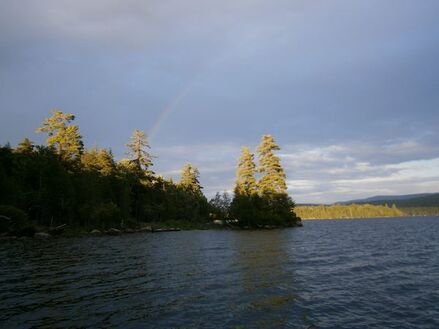 A friend--photographer--told me he didn't like to take pictures of raibows, they were too ephemeral he said, not meant to be photographed. I happened to catch this one over the point by Silver Beach on Raquette Lake while sitting on the porch of a cabin I rented. It's faint, but we all know what it feels like to see a rainbow in the sky. Even though it's fleeting, we just sit and stare until it goes away, hoping to hang onto that magical feeling it brings for as long as we can. Maybe that's why photographers chase rainbows, sunsets, full moons, shadows in the woods. Why artists paint capture scenes and authors write about them. These moments are why people create; to make something last, a feeling, an experience, a moment in time. 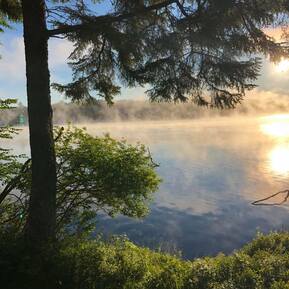 There's a poem called This Too Shall Pass Away, written by Ella Wheeler Wilcox 1900 which refers to a story about an ancient King who asks his sages to find words of wisdom that would guide him. One of them brought back a ring with the saying 'this too shall pass' inscribed inside (or so various versions of the story go). The meaning, that all things are temporary, much like the rainbow, is hard to swallow. How can this moment of joy be taken away? Yet, the same goes for those times of sorrow. It is only temporary. If only we could remember this when things seem so bleak. As I work on my novel about the Durant family I realize this may be what they were striving for, to leave a legacy, even if it wasn't in the form of wealth. The Durant's were creators. William built Great Camps in the Adirondacks, that would withstand the elements of the Northern Woods. Ella Durant published her poetry. Their father, Dr. T.C. Durant built railroads across the country. I see how all of it, the hard work, the drive to perfection, to discover more about how to turn a vision into reality - all of it - is an attempt to fight that adage that this too shall pass. Maybe, what drives the creator of such works, is an attempt, like Ozymandias, to leave a behind a legacy that fights back at time. Maybe that's why I write. 1/8/2019 Preserving Public History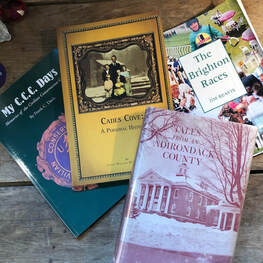 This is an ode to those public historians who went out of their way to write and publish local history that would otherwise have been forgotten. Whether it was about their own past experience, or the history of a place, these books are gems for those of us writing historical fiction. They are accounts of the ordinary people, ones who may not have been famous, but whose lives are the fabric of the past. I've found my share of these treasures while researching my novels. 12/18/2018 Women Authors Are Not a Trend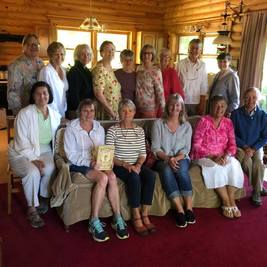 My visit with Ladies of the Lake Book Club Raquette Lake NY. My visit with Ladies of the Lake Book Club Raquette Lake NY. While attending a writers conference recently the speaker, a literary agent, was asked what he viewed as a trend in the industry. His answer was publishers were looking for women who write about women. He predicted, like most trends, this was fleeting and would either end or balance out. I began to wonder if what he deems a trend is really just an adjustment in a long history of marginalization of women authors. Just cursory research shows women authors have been under-represented for awards. Since 1901, the Nobel Prize for Literature has only been awarded to 14 women. There have only been 35 women winners of the Pulitzer Prize for fiction since it was first awarded in 1917. While disconcerting, it also doesn't match up with the trends in women readership. I was intrigued by all of this because I've been in a book club for over 15 years. As an author I've been invited to speak with several book clubs. All organized and attended by women. Just recently, I spoke to my largest audience ever - 140 ladies in Charlotte, NC - who call themselves the JULIETS (Just us ladies interested in learning, eating, talking and sharing). And as an author, I've been privileged to be able to network with other women authors in such online forums and memberships groups as the Women Fiction Writers Association and Women Writers Women's Books. Both organizations have a strong following. They offer guidance, mentoring, educational and promotional opportunities for women from diverse backgrounds. |
AuthorSheila Myers is an award winning author and Professor at a small college in Upstate NY. She enjoys writing, swimming in lakes, and walking in nature. Not always in that order. Archives
April 2024
CategoriesAll Adirondacks Algonquin Appalachia Award Cades Cove Canada Chestnut Trees Christmas Civilian Conservation Corps Collis P. Huntington Creativity Doc Durant Durant Family Saga Emma Bell Miles Finger Lakes Great Depression Hell On Wheels Historical Fiction History Horace Kephart Imagination National Parks Nature Publishing Review Screenplay Short Story Smoky Mountains Snow Storm Stone Canoe Literary Magazine Thomas Durant Timber Wilderness World War II Writing |
|
|
All materials Copyright 2022
Any reproduction, reprint or publication without written consent of author prohibited. |
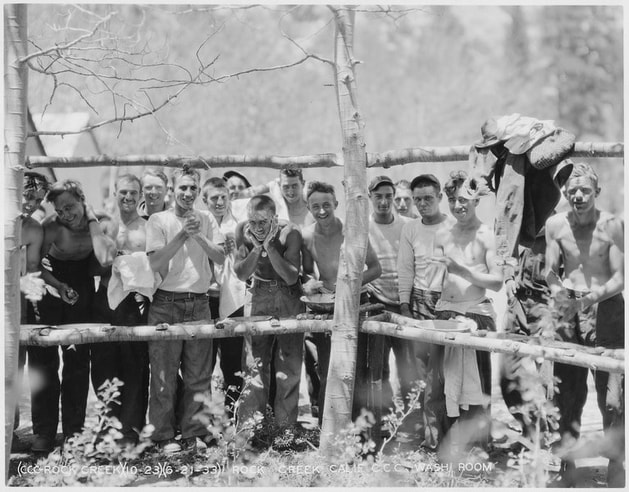

 RSS Feed
RSS Feed